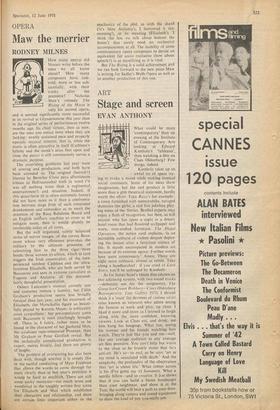OPERA
Maw the merrier
RODNEY MILNES
How many operas did Mozart write before the ones we all know about? How many composers have tink- ered, more or less sub- stantially, with their works after the premiere? Nicholas Maw's comedy The Rising of the Moon is only his second opera, and it seemed significantly more successful in its revival at Glyndebourne this year than in the original series of performances twelve months ago. Its chief virtues, then as now, are the ones you notice most when they are lacking: evenly sustained pace and properly operatic musical interest; that is, while the music is often attractive in itself (Cathleen's lullaby and the monk's arias that open and close the piece) it still continuously serves a dramatic purpose.
The overriding problems last year were of scoring and production, and both have been attended to. The original (hurrah!) libretto by Beverley Cross pays affectionate tribute to Hofmannsthal both in word ('it was all nothing more than a regimental entertainment') and situation. Indeed, if this quasi-farce (it is often extremely funny) did not have more to it than a confronta- tion between stage Irish of such consistent drunkenness and cowardice as to merit the attention of the Race Relations Board and an English military machine so crass as to mitigate same, then it would plainly be intolerable today of all times.
But the well organised, subtly balanced series of mirror images. of the cornet Beau- mont whose very effeteness provokes the military to the ultimate grossness of submitting him to the three cigar/three bottle/three women tri-athlon, which in turn triggers the Irish counterplot; of the inex- perienced tomboy Cathleen and the ultra- feminine Elisabeth, who are both served by Beaumont and seen in extreme caricature as Eugenie and Atalanta: all this demands fairly thoughtful presentation.
Osbert Lancaster's musical comedy sets and costumes remain a liability, but Colin Graham's production seems less broadly farcical than last year. and his treatment of Elisabeth, the Marschallin figure so beauti- fully played by Kerstin Meyer, is noticeably more sympathetic: her pre-copulatory scene with Beaumont is most touchingly brought off. There is, I fancy, rather more to be found in the character of her)usband Max, the .coi-disant rape-orientated Prussian, than Mr Graham or Peter Gottlieb reveal. But the technically complicated production is expert, moves briskly, Wand there are plenty of laughs.
The problem of overscoring has also been dealt with, though whether it is simply this or the tactful conducting of Myer Fredman that allows the words to come through far more clearly than at last year's premiere it would be hard to establish. There are still some sticky moments—too much brass and woodwind in the toughly written first scene for Elisabeth and Max which establishes their characters and relationship, and there are certain lines important either to the mechanics of the plot, as with the shawl (it's Miss Atalanta's, I borrowed it this morning'), or its meaning (Elisabeth's 'I think the less we talk about honour the better') that surely need no orchestral accompaniment at all. The inability of some contemporary opera composers to devise an equivalent for secco recitative (how about speech?) is as mystifying as it is vital.
But The Rising is a solid achievement and we can look forward to the new piece Maw is writing for Sadler's Wells Opera as well as to another production of this one.


































 Previous page
Previous page